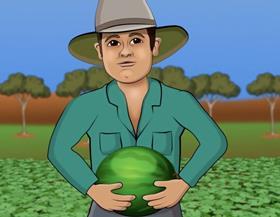
The Australian Melon Association (Melons Australia) has developed a video series highlighting the role travelling holiday makers can play in maintaining strong on-farm biosecurity.
Thethree-part series details the steps travellers can take to make sure they don’t unwittingly take pests or diseases into melon growing areas.
The campaign will initially be geared towards growing regions in the Northern Territory, Western Australia and Queensland, where harvest runs from August to December.
Melons Australia biosecurity officer, Joanna Embry, hoped a new sense of understanding around the spread of Covid-19 would be applied to the horticultural sector, amplifying the campaign’s message.
“Despite current travel restrictions between states, there are still plenty of local travellers who are choosing to explore their own backyards for the first time, which makes our biosecurity message doubly important,” said Embry.
“As we’ve all learnt this year, minimising the risks of pest and disease really does take a collaborative effort. A grower can do all the right things and have the tightest levels of biosecurity, but all it takes it one minor incident – like a well-meaning holiday maker to step into their paddock – for a major biosecurity breach to occur.”
Embry saidtravellers entering farms without permission to look at crops or harvest fruit was one of the most cited biosecurity problems for melon growers.
“Melon farms are often in remote areas but near areas of natural beauty that attract travellers and backpackers, sowe really hope that holiday makers of all travel demographics learn something from these short videos and that the travel sector gets behind our awareness campaign,” Embry explained.
“We’d like all travellers to know how much all Australian melon growers and the broader horticulture and agriculture industries appreciate their efforts.”
The videos are available from the Melons Australia website.



